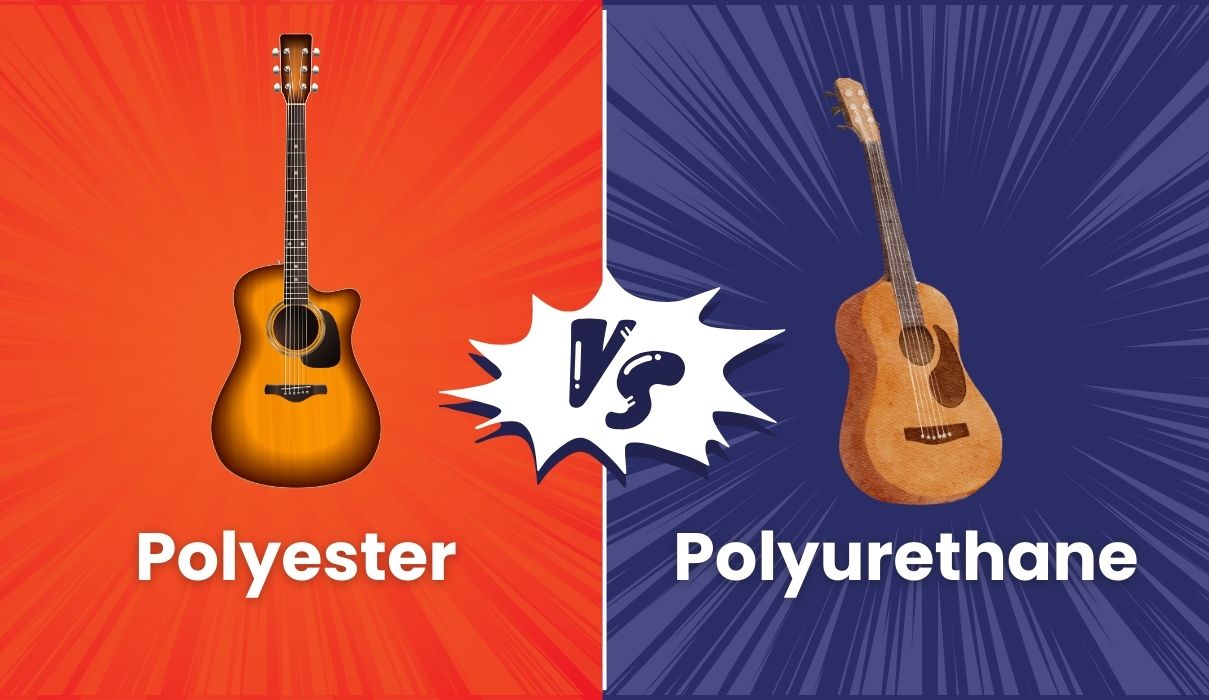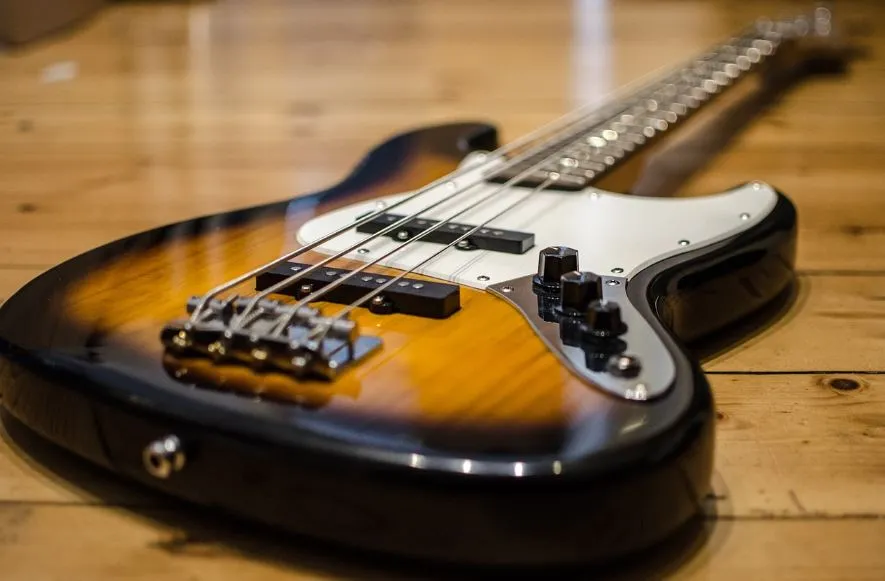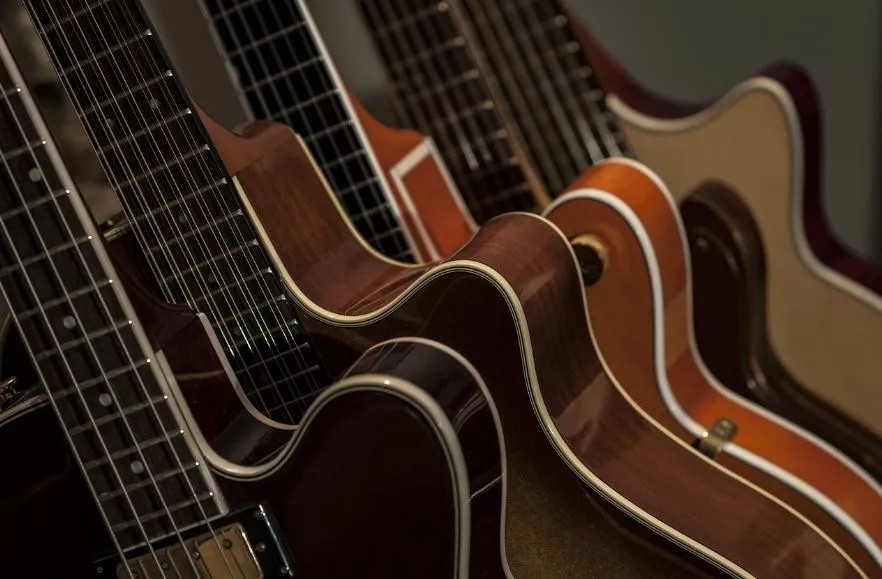· Dustin Greenfield · Guitars · 6 min read
Polyester vs Polyurethane Guitar Finish: The Ultimate Guide
Exploring the differences between polyester vs polyurethane guitar finish, I'll delve into the pros and cons of each. By the end of this article, you'll be able to make an informed decision when it comes to choosing the perfect finish for your guitar.

Exploring the differences between polyester vs polyurethane guitar finish, I’ll delve into the pros and cons of each. By the end of this article, you’ll be able to make an informed decision when it comes to choosing the perfect finish for your guitar.
Key Takeaways
- 🎸 Polyester finishes have been used since the 50s, offering durability and a high gloss appearance. However, they may feel artificial to the touch and can be difficult to repair if damaged.
- 🎨 Polyurethane finishes give a natural feel and are resistant to weathering. They offer versatility ranging from matte to high-gloss finishes, but may yellow over time if not properly cured.
- 🔄 The comparison between the two finishes depends on personal preference and playing style. Polyester is suitable for those requiring durability and gloss, while polyurethane is for those desiring a natural feel and weather resistance.
- 🛠️ While polyester finishes are hard-wearing and resistant to scratches, they are difficult to repair. On the other hand, polyurethane finishes, despite needing more coats for gloss, can be easily repaired.
- 👍 Both have their pros and cons, so it’s important for players to consider their specific needs, playing style, desired aesthetic, and maintenance preferences when choosing a finish. Remember, there are more options beyond these two, such as nitrocellulose lacquer and oil finishes.
Also read Https://Styleofpop.Com/Drum Booth Size
Guitar Finish Types
Polyester Guitar Finish

Polyester finishes have been widely used in guitar manufacturing since the 1950s. They are typically applied as a topcoat over a colored base coat, resulting in a high-gloss appearance. Polyester finishes are known for their durability and resistance to scratches and stains. They are also relatively easy to apply, which can make them a cost-effective option for guitar manufacturers.
Applying a polyester finish typically involves spraying on multiple thin coats until the desired thickness is achieved. The finish is then sanded and polished to create a smooth and glossy surface.
Polyurethane Guitar Finish
Polyurethane finishes have become increasingly popular in recent years due to their versatility and ability to provide a more natural feel. They are also known for their excellent protection against weathering and aging. Polyurethane finishes can be formulated to achieve different levels of gloss, from matte to high gloss.
Polyurethane finishes are applied in a similar way to polyester finishes, typically as a topcoat over a colored base coat. However, they may require more preparation and care during application due to their tendency to yellow over time if not properly cured.
Also read Https://Styleofpop.Com/Best Vibrolux Speakers
The Benefits of Polyester Guitar Finish
Here are some of the benefits you can expect from a polyester finish:
- Durability: Polyester finishes are incredibly hard-wearing, making them ideal for players who use their guitars frequently. Unlike some other finishes, polyester can withstand heavy usage without wearing down or scuffing easily.
- High-gloss appearance: Polyester is known for its high-gloss finish, which gives your guitar a sleek, professional look. This finish looks especially good on darker woods, such as mahogany and rosewood.
- Resistance to scratches and stains: Polyester finishes are incredibly resistant to scratches and stains, which is great news if you’re someone who tends to be rough on your guitar. Polyester can resist most common types of damage, including chips, dents, and discolouration.
Some of the cons of using a polyester finish on your guitar include:
- Lack of natural feel: Because of its thickness, polyester finishes can feel somewhat artificial to the touch. This may not be a problem for some players, but those who prefer a more natural feel to their guitar may find it somewhat off-putting.
- Difficulty with touch-ups and repairs: Polyester finishes are notoriously difficult to repair or touch up. While scratches and dents can be filled, the repair process can be time-consuming and expensive, making it important to take good care of your guitar from the outset.
Overall, polyester finishes represent a solid choice for players who value durability and a high-gloss appearance. Just bear in mind that it may take some time and effort to maintain your guitar’s finish in top condition over the course of its life.
Also read Https://Styleofpop.Com/What Happened To Agile Guitars
The Benefits of Polyurethane Guitar Finish
| Advantage | Description |
|---|---|
| Natural Feel | Polyurethane finishes are thinner and lighter than polyester finishes, giving the guitar a more natural feel when playing. |
| Weather Resistance | Polyurethane is more resistant to weathering, making it a good choice for guitars used in outdoor gigs or humid environments. |
| Versatility | Polyurethane finishes can achieve different levels of gloss, from a matte finish to a high-gloss shine. This provides more versatility in achieving the desired appearance for the guitar. |
Also read Https://Styleofpop.Com/Bass Drum Pedal Wont Bounce Back
Comparison of Polyester and Polyurethane Finishes
As we’ve seen, polyester and polyurethane guitar finishes both have their own unique strengths and benefits. To help you decide which finish is right for your guitar, let’s compare these two types side by side.
| Factor | Polyester Finish | Polyurethane Finish |
|---|---|---|
| Application Process | Applied in thick layers, requiring careful sanding between layers for a smooth finish. | Can be applied in thinner layers, with less need for sanding between coats. Can also be applied via spray-on methods. |
| Appearance | Typically yields a high-gloss finish that can be prone to yellowing over time. | Can achieve a wide range of gloss levels, from matte to high-gloss. Less prone to yellowing than polyester finishes. |
| Durability | Offers excellent protection against scratches and stains. Can be more brittle than polyurethane, making it more prone to cracking over time. | Provides excellent protection against weathering and wear. Can be more flexible than polyester, making it less prone to cracking. |
| Ease of Repair | Can be difficult to repair once damaged or scratched. Requires sanding and refinishing of the entire affected area. | Can be repaired more easily than polyester finishes. Small scratches can often be buffed out without needing to refinish the entire area. |
Overall, the choice between polyester and polyurethane guitar finishes will depend on your personal preferences and priorities. If you value a high-gloss appearance and excellent scratch resistance, polyester may be the way to go. On the other hand, if you’re looking for versatility in gloss levels and long-term durability, polyurethane might be the better choice.
Also read Https://Styleofpop.Com/About Us
Evaluating the Better Guitar Finish: Polyester vs Polyurethane Guitar Finish

If you prioritize durability and scratch resistance, then polyester may be the way to go. Its tough finish can withstand long hours of playing and travel without showing wear and tear. Additionally, polyester finishes often produce a high-gloss appearance that many guitarists prefer.
On the other hand, polyurethane finishes offer a more natural feel to the guitar’s body. This type of finish is known for providing excellent protection against weathering and aging. Polyurethane finishes also have versatility when it comes to achieving different gloss levels, from matte to high gloss.
Ultimately, there is no clear winner in the debate between polyester and polyurethane guitar finishes. Both types have their unique strengths and weaknesses, and the best way to determine which one suits you is by considering your personal preferences and needs.
Also read Https://Styleofpop.Com/Best Guitar Picks For Metal
Conclusion
After exploring the differences between polyester and polyurethane guitar finishes, it’s clear that each type has its own unique qualities and benefits. It’s worthwhile exploring all options before making a final decision.



